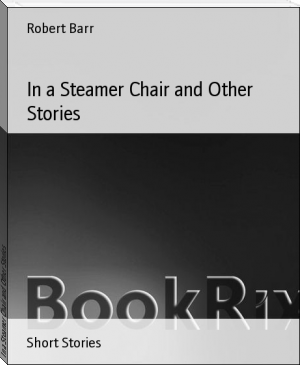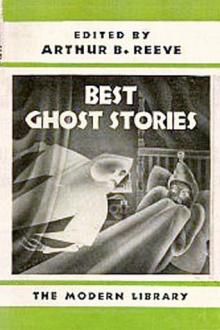In a Steamer Chair and Other Stories - Robert Barr (rm book recommendations .TXT) 📗

- Author: Robert Barr
Book online «In a Steamer Chair and Other Stories - Robert Barr (rm book recommendations .TXT) 📗». Author Robert Barr
"And don't you think, George, that I might have something to say about that?"
"Oh, certainly! I intended to talk with you about it. Of course I am talking with you now on that subject. You admitted the possibility of our getting married. I believe I had better get you to put it down in writing, or have you say it before witnesses, or something of that sort."
"Well, I shouldn't like to be married in a hotel."
"In a church, then? I suppose I can make arrangements that will include a church. A parson will marry us. That parson, if he is the right sort, will have a church. It stands to reason, therefore, that if we give him the contract he will give us the use of his church, _quid pro quo_, you know."
"Don't talk flippantly, please. I think it better to wait until to-morrow, George, before you do anything rash. I want to see something of the country. I want us to take a little journey together to-morrow, and then, out in the country, not in this grimy, sooty city, we will make arrangements for our marriage."
"All right, my dear. Where do you intend to go?"
"While you have been wasting your time in getting information relating to matrimony, I have been examining time-tables. Where I want to go is two or three hours' ride from here. We can take one of the morning trains, and when we get to the place I will allow you to hire a conveyance, and we will have a real country drive. Will you go with me?"
"_Will_ I? You better believe I will. But you see, Katherine, I want to get married as soon as possible. Then we can take a little trip on the Continent before it is time for us to go back to America. You have never been on the Continent, have you?"
"Never."
"Well, I am very glad of that. I shall be your guide, philosopher, and friend, and, added to that, your husband."
"Very well, we will arrange all that on our little excursion to-morrow."
NINTH DAY.
Spring in England--and one of those perfect spring days in which all rural England looks like a garden. The landscape was especially beautiful to American eyes, after the more rugged views of Transatlantic scenery. The hedges were closely clipped, the fields of the deepest green, and the hills far away were blue and hazy in the distance.
"There is no getting over the fact," said Morris, "that this is the prettiest country in the whole world."
During most of the journey Katherine Earle sat back in her corner of the first-class compartment, and gazed silently out of the flying windows. She seemed too deeply impressed with the beauty of the scene to care for conversation even with the man she was to marry. At last they stopped at a pretty little rural station, with the name of the place done in flowers of vivid colour that stood out against the brown of the earth around, them and the green turf which formed the sloping bank.
"Now," said George, as they stood on the platform, "whither away? Which direction?"
"I want to see," said she, "a real, genuine, old English country home." "A castle?"
"No, not a castle."
"Oh, I know what you want. Something like Haddon Hall, or that sort of thing. An old manor house. Well, wait a minute, and I'll talk to the station master, and find out all there is about this part of the country."
And before she could stop him, he had gone to make his inquiry of that official. Shortly after he came back with a list of places that were worth seeing, which he named.
"Holmwood House," she repeated. "Let us see that. How far is it?"
George again made inquiries, and found that it was about eight miles away. The station-master assured him that the road thither was one of the prettiest drives in the whole country.
"Now, what kind of a conveyance will you have? There are four-wheeled cabs, and there is even a hansom to be had. Will you have two horses or one, and will you have a coachman?"
"None of these," she said, "if you can get something you can drive yourself--I suppose you are a driver?"
"Oh, I have driven a buggy."
"Well, get some sort of conveyance that we can both sit in while you drive."
"But don't you think we will get lost?"
"We can inquire the way," she said, "and if we do get lost, it won't matter. I want to have a long talk with you before we reach the place."
They crossed the railway by a bridge over the line, and descended into a valley along which the road wound.
The outfit which George had secured was a neat little cart made of wood in the natural colour and varnished, and a trim little pony, which looked ridiculously small for two grown people, and yet was, as George afterwards said, "as tough as a pine knot."
The pony trotted merrily along, and needed no urging. George doubtless was a good driver, but whatever talents he had in that line were not brought into play. The pony was a treasure that had apparently no bad qualities. For a long time the two in the cart rode along the smooth highway silently, until at last Morris broke out with--
"Oh, see here! This is not according to contract. You said you wanted a long talk, and now you are complacently saying nothing."
"I do not know exactly how to begin."
"Is it so serious as all that?"
"It is not serious exactly--it is merely, as it were, a continuation of the confession."
"I thought we were through with that long ago. Are there any more horrible revelations?"
She looked at him with something like reproach in her eyes.
"If you are going to talk flippantly, I think I will postpone what I have to say until another time."
"My dear Kate, give a man a chance. He can't reform in a moment. I never had my flippancy checked before. Now then, I am serious again. What appalling--I mean--you see how difficult it is, Katherine--I mean, what serious subject shall we discuss?"
"Some other time."
"No--now. I insist on it. Otherwise I will know I am unforgiven."
"There is nothing to forgive. I merely wanted to tell you something more than you know about my own history."
"I know more now than that man in the story."
He did not object to the knowledge, you know. He objected to receiving it from a third person. Now I am not a third person, am I?"
"Indeed, you are not. You are first person singular--at present--the first person to me at least. There, I am afraid I have dropped into flippancy again."
"That is not flippancy. That is very nice." The interval shall be unreported.
At last Katherine said quietly, "My mother came from this part of England."
"Ah! That is why you wanted to come here."
"That is why I wanted to come here. She was her father's only daughter, and, strange to say, he was very fond of her, and proud of her."
"Why strange?"
"Strange from his action for years after. She married against his will. He never forgave her. My father did not seem to have the knack of getting along in the world, and he moved to America in the hope of bettering his condition. He did not better it. My father died ten years ago, a prematurely broken down man, and my mother and I struggled along as best we could until she died two years ago. My grandfather returned her letter unopened when mother wrote to him ten years ago, although the letter had a black border around it. When I think of her I find it hard to forgive him, so I suppose some of his nature has been transmitted to me."
"Find it hard? Katherine, if you were not an angel you would find it impossible."
"Well, there is nothing more to tell, or at least, not much. I thought you should know this. I intended to tell you that last day on shipboard, but it seemed to me that here was where it should be told--among the hills and valleys that she saw when she was my age."
"Katherine, my dear, do not think about it any more than you can help. It will only uselessly depress you. Here is a man coming. Let us find out now whether we have lost our way or not."
They had.
Even after that they managed to get up some wrong lanes and byways, and took several wrong turnings; but by means of inquiry from every one they met, they succeeded at last in reaching the place they were in search of.
There was an old and grey porter's lodge, and an old and grey gateway, with two tall, moss-grown stone pillars, and an iron gate between them. On the top of the pillars were crumbled stone shields, seemingly held in place by a lion on each pillar.
"Is this Holmwood House?" asked Morris of the old and grey man who came out of the porter's lodge.
"Yes, sir, it be," replied the man.
"Are visitors permitted to see the house and the grounds?"
"No, they be'ant," was the answer. "Visitors were allowed on Saturdays in the old Squire's time, but since he died they tell me the estate is in the courts, and we have orders from the London lawyers to let nobody in."
"I can make it worth your while," said George, feeling in his vest pocket; "this lady would like to see the house."
The old man shook his head, even although George showed him a gold piece between his finger and thumb. Morris was astonished at this, for he had the mistaken belief which all Americans have, that a tip in Europe, if it is only large enough, will accomplish anything.
"I think perhaps I can get permission," said Katherine, "if you will let me talk a while to the old man."
"All right. Go ahead," said George. "I believe you could wheedle anybody into doing what he shouldn't do."
"Now, after saying that, I shall not allow you to listen. I shall step down and talk with him a moment and you can drive on for a little distance, and come back."
"Oh, that's all right," said George, "I know how it is. You don't want to give away the secret of your power. Be careful, now, in stepping down. This is not an American buggy," but before he had finished the warning, Katherine had jumped lightly on the gravel, and stood waiting for him to drive on. When he came back he found the iron gates open.
"I shall not get in again," she said. "You may leave the pony with this man, George, he will take care of it. We can walk up the avenue to the house."
After a short walk under the spreading old oaks they came in sight of the house, which was of red brick and of the Elizabethan style of architecture.
"I am rather disappointed with that," said George, "I always thought old English homesteads were of stone."
"Well, this one at least is of brick, and I imagine you will find a great many of them are of the same material."
They met with further opposition from the





Comments (0)